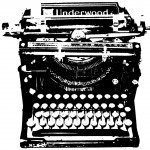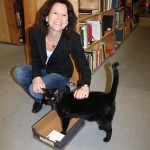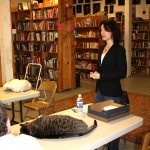Midge Raymond's Blog, page 51
January 9, 2011
Stuff for writers: "old" authors, short (and shorter) stories, and more
Given the way our culture celebrates youth (including writers), I really enjoyed this post by Randy Susan Meyers in the Huffington Post: a list of 41 writers whose debut novels were published after they turned 40 (among them: Meyers' own book, The Murderer's Daughters , as well as National Book Award winner Julia Glass and Pulitzer winners Paul Harding, Edward P. Jones, and Elizabeth Strout).
, as well as National Book Award winner Julia Glass and Pulitzer winners Paul Harding, Edward P. Jones, and Elizabeth Strout).
Many authors, both emerging and established, are choosing to self-publish these days, and those of you who are emerging D.I.Y. authors will want to check out this post by Alan Rinzler on literary agents taking on self-published writers to see what agents are saying, both pro and con. Of course, many self-published authors (like John Yunker, author of the The Tourist Trail) already have agents; they just weren't able to find publishers. For those of you in that category, also be sure to see Rinzler's list of top genres for multi-book deals in 2010, along with his tips on how to "make publishers drool." And then there are those self-published authors who are already successful and decide to go solo; this article highlights a couple of these writers.
For those of you who love short stories (and who doesn't?!), check out Storyville, an iPhone/iPad app that brings stories directly to your device. It's $4.99 for six months' worth of stories — one each week. And even better news for short story (and literary novel) readers: Andrew's Book Club is back! And there's already a new pick for the new year.
Maybe it's our diminishing attention spans, but stories seem to be getting shorter and shorter and shorter. Along with flash fiction, micro fiction, and prose poems, we now have "hint fiction" (check out this NPR story for samples).
As I'm sure you've heard by now, The Paris Review has made its interviews available online — an amazing series of author interviews all the way back to the 1950s.
If you draw inspiration from seeing where writers work, in the U.S. there are 73 writers' houses open to the public, including Norman Mailer's and Edith Wharton's.
And did you know that for 90 percent of what we communicate, we use only about 7,000 words? We're losing words from the English language every day, and Oxford University Press hopes to save them with Save the Words, where you can visit with long-lost words and offer up your own words for safekeeping.

January 3, 2011
The debut of the Weekly Writing Exercise
Happy new year, writers!
There's nothing like a new year to inspire us toward new writing resolutions (especially if some of last year's goals didn't quite make it to completion in 2010…or is this just me?).
One of my goals for the new year is to begin a regular writing practice — that is, not simply to focus on projects but on the joys of random writing (which, as we all know, can have marvelous effects on our writing projects, whether it's generating new material or finding the perfect piece to an unresolved puzzle). So I've been getting up early (early! before sunrise, believe it or not) and taking the time to write before doing anything else (with the possible exception of making coffee, when necessary). And so far, so good.
I like to use writing prompts to jump-start my writing session (I need it, especially at such an early hour), and I've been using the revised edition of Judy Reeves' wonderful book A Writer's Book of Days . I also have a great many writing prompts saved up from years' worth of teaching writing — and so I thought one way to stay inspired would be to offer them here.
. I also have a great many writing prompts saved up from years' worth of teaching writing — and so I thought one way to stay inspired would be to offer them here.
So each week I'll be posting a new writing exercise — one that I've made up, or I'll feature one from another author's collection. And if you have a writing exercise to share — or if you'd like to point me toward one — please contact me; I'd love to include it.
This week, I'd like to feature Judy's prompt for January 3 (from A Writer's Book of Days ):
):
You're in a courtyard.
Intriguing, isn't it? Just the sort of prompt I love to see on an otherwise blank page.
Happy new year, and happy writing.


January 2, 2011
Awesome bookstores around the world
Now that 2011 is here, I'm thinking ahead to the events and readings I hope to do this summer — and also looking back on the fantastic and generous bookstores that hosted me in 2010 (among them, Pilot Books in Seattle and Warwick's in San Diego). This has led me to think about other fantastic bookstores around the country and the world — which, as it turns out, is something a lot of readers and writers think about.
Here's one of my all-time favorites, El Ateneo, housed in a converted theater in Buenos Aires:
This Huffington Post list of readers' favorites includes many of my own, as does Flavorwire's top 10. And El Ateneo is on this list of converted bookstores (if you think converting a theater into a bookstore is creative, how about ships, trailers, and manure tanks? not to mention castles and movie theaters) — as well as Lonely Planet's top 1o greatest bookshops.
And one of the best things about an independent bookstore, of course, is the bookstore cat (or cats). I loved doing a workshop and reading at King's Books in Tacoma, Washington, along with two feline attendees:
(I did not take it personally when both cats fell asleep on the tables during my workshop.)
For Bay Area readers and cat people, the San Francisco Chronicle compiled a list of bookstore cats that includes some very important stats: the cats' favorite food, favorite places/genres for sleeping, and estimated amount of time spent sleeping.
I hope 2011 brings us all to many more fabulous independent bookstores — let's not forget how much we writers and readers need them, and how much they need our support, too.

December 7, 2010
Author photos: A Q&A with Rosanne Olson
Perhaps some authors love having their photos taken, but I'm not one of them. In fact, I was planning to use my current author photo until the end of time … until I discovered the lovely photographs of Seattle photographer Rosanne Olson.
I first encountered Rosanne's work in her beautiful book, This Is Who I Am, a collection of images and essays on women, body image, and compassion that Kate Winslet called "an absolutely wonderful book" and declared, "Every woman needs to see it!" As well as an author, Rosanne is an award-winning photographer and photojournalist who also has more than thirty years' experience as a teacher and lecturer. She is particularly passionate about telling stories through portraits — of women, families, business professionals…and, yes, authors.
Rosanne generously agreed to chat with me about author photos, and already I'm looking forward to working with her on my new author photo (if I ever finish my next book, that is).
What do you think makes a good author photo?
The photograph needs to convey how the author wants to portray himself/herself. Usually that means approachable, intelligent, engaging. Some people are more dramatic in how they want to be seen. Some are more friendly or sophisticated.
What advice can you offer to writers who are nervous about having their photos taken?
People come to me with varying degrees of "nervousness" about how they look and how they "photograph" ("No one has ever taken a good photo of me" is a common complaint). This is very natural. My approach to get people to relax is to spend time talking to my clients before I pick up my camera. I also will likely read some of their work prior to the session. I make recommendations about clothing and makeup, and then, as the session proceeds, share some of the digital images with the client. I like to make them feel that they are in competent and compassionate hands with something that is very precious to them. After the session, I get them to sit with me to edit the photos to make sure they get the look they want.
What are the biggest mistakes authors make when it comes to their photos?
Sometimes people come here with too much makeup on. Or they bring their clothing stuffed into a bag so everything is wrinkled. Believe me, not just authors do this but lots of people. It is actually pretty amusing except for the fact that clothing then needs to be pressed or steamed here. Aside from that, people are usually willing to trust me to do the best possible job that I can with them. It is an exquisite collaboration.
What should an author expect to pay for a professional author photo?
Nationally speaking, I imagine photographers charge somewhere between $150 and $2,500. I try to work with people and their budgets. If you pay the least amount possible for a photo you may get something okay. Or even just fine. But will it work for years to come? It is definitely an important investment.
Do you recommend color or black-and-white for author photos — and why?
Things are shot digitally these days so all images come out in color and it takes an extra step to convert them to black-and-white or sepia. That said, I think color conveys more because it is, well, color.
Do you have any recommendations for authors who are looking for a photographer? What questions should they ask?
An author photo is an important piece of one's "brand." If you have a photo you like, you can use it for years. When people see it they will think of you and of your work. I think of some of the famous, famous photos of people like Ernest Hemingway and Raymond Carver and how they convey so much at a glance. Pick your photographer by looking at the photographer's web site and perhaps talking on the phone. Also, ask for references from other artists and authors who have been photographed by that person.
For another recent conversation with Rosanne, visit poet Susan Rich's blog (Rosanne's photo of Susan is directly above…and above that is author Wendy Call) — and click here to win a copy of This Is Who I Am.

November 29, 2010
We need to talk about your Amazon sales rankings…
Forgetting English finally has a book trailer! It's actually more of a short story than a trailer, and it's the result of a collaboration with my husband, whose book The Tourist Trail plays a major role. Needless to say, we had a lot of fun.
It's called "Love in the Time of Amazon.com." Enjoy.

November 18, 2010
Ask Midge: Is there a bad time to query an agent?
Q: I am looking to pitch agents with my query and book proposal for my first book. However, with holidays approaching, should I wait till January 2011 to send them out? Does the industry, like all others, also go through a lull from November to January? — P.J., Seattle
A: It's true that the publishing industry goes through a bit of a lull during the holidays. (At the publishing house where I used to work, it began on Halloween — the kegs rolled in around noon, and that was it for the rest of the day.) Every publisher is different, but from November to the end of December, things are definitely a little slower — and the summers are slower as well (on "summer Fridays" most of us were out the door by noon). That's not to say that deals aren't being made during these times — just not quite as many. If you subscribe to a trade publication like PublishersMarketplace or Publishers Weekly, you'll start to get a feel for the busy and slow times of year in the industry.
Agents, however, are always looking for good material, and in my experience there's no bad time of year to query an agent. In fact, because the end of the year is slower for editors and publishers, this may be a good time to get an agent's attention; an agent may be focused on finding new clients rather than selling projects. Of course, it's a busy time of year for most people in general — but keep in mind that for agents who read queries in the order received, you'll still have yours read first if you send it in November versus in January.
Another thing to consider is that the agent who represents you will likely have revisions for you — and it's great to have time to work on these during a slower time for publishers. And even if your manuscript/proposal needed no revisions at all, your agent would likely wait to submit the project in the new year anyway.
That said, there are no rules here, only preferences. Be sure to read an agency's guidelines carefully; each agency is different. Some agencies or agents may stop reading over the holidays, or during big industry events, or for any number of reasons — so always check before you query (if the agent has a blog, this is a great way to find out his or her preferences).
Finally, and most important: Take the time you need to make sure your query is the best it can possibly be — this is what will get an agent's attention, far more than what time of year you send it.
Best of luck!

November 15, 2010
Stuff for writers
On Character
Ever wondered about the subtle differences in accents between an Australian and a New Zealander? Or how to tell by accent whether someone is from Florence or from Sicily? Check out the Speech Accent Archive, which exhibits a large set of speech accents from a variety of language backgrounds. Native and non-native speakers of English all read the same English paragraph, and you can listen to a recording and/or view the phonetic spellings.
And speaking of subtle differences, characterization is all about getting the details right. Does your character say soda, Coke, or pop? Check out this map to see in which regions of the U.S. which terms are used.
On Procrastination
If you don't already have enough ideas for how to procrastinate, check out this short animated film on procrastination by Johnny Kelly. It's funny as well as spot-on.
This neat little program from Pilot will turn your own handwriting into a font, so you can type "handwritten" letters.
And finally, check out Underwood: Stories in Sound, founded by writer Nathan Dunne, who turned his love for short stories and vinyl records into a twice-yearly publication produced as a vinyl LP featuring two writers.

November 1, 2010
Ask Midge: To stet or not to stet? How to handle edits you don't like
Q: I just received edits from the literary magazine that is publishing my story, and while some of them are improvements, I don't agree with all of them. Do I have to make every single one? — CG, New York City
A: First, congratulations! Most literary journals publish only a small percentage of the submissions they receive, and having a piece accepted is a big accomplishment. So first — celebrate.
Then, you'll need to deal with the edits. How heavily a story is edited depends entirely upon the magazine and the editors — sometimes you'll find that editors make a lot of suggestions; other times they'll accept a story with very few minor changes. It can be jarring, at first, to have your story returned with a lot of changes — so my first tip would be to read through all the edits, then put the story away for a bit (deadlines permitting). It often takes a little time to absorb the idea of edits as well as the edits themselves.
Next, go through the edits and see which ones you agree with; these are the easy ones to make. If there are still a few suggestions that you don't agree with and would like to stet (stet=let it stand), then you'll have to make choices. In my experience, I've found that most editors are fairly flexible and that their suggestions are usually just that: suggestions. So if you've reread your piece, given it a little time and space, and still disagree with an editor's suggestions, go ahead and make a case for keeping these sections as is. Reply to the editor and thank him/her for the suggested changes and explain why you want to stet the edits. And have a good reason, not just "I like it better this way"; editors usually have a good reason behind every edit, even if it may not be immediately clear to you. And being polite and appreciative will go a long way — thoughtful editing takes a lot of time and energy, and before rejecting any changes, you'll want to show that you've given the changes some thought and have good reasons for asking to stet them.
You may get to keep your darlings — but you may find that your editor is adamant about the changes. In this case, you'll have a couple of things to consider. First, how much do you feel the edits change your story, and second, can you live with these changes? If you don't agree with them but find that the heart and soul of your story remains intact, it may be worth it to let go. There's quite a bit of give-and-take involved in the editing process, so think about which changes you can accept and which you absolutely cannot. Then, pick your battles.
If you find that there are certain changes you absolutely can't accept, be prepared for an editor to stand firm — sometimes publication is contingent on your making certain changes. I once had a story accepted that was contingent upon my changing the ending. After careful consideration, I felt that changing the ending in the way the editor suggested didn't fit the theme of the story as a whole, and I declined to make the change. As a result, the magazine withdrew its offer of publication, and the story wasn't published for many years. Still, I don't regret the decision I made — endings are a big deal, and I would rather have waited than to have had the story published in a way that didn't feel right.
On the other hand, there have been many other times in which I've given in to changes I don't love because I wanted to see the story out in the world. These changes have been easier to make because even if I don't love or entirely agree with them, in the end, I realize that the changes don't affect the story in a big way and are likely noticeable only to me.
At the risk of sounding snooty, another thing for you to consider is the caliber of the magazine in question. You should always be submitting only to journals that you like, respect, and would be proud to see your work appear in — but again, you don't know until you've been accepted how heavily your work might be edited. If you're an emerging writer and The New Yorker is asking you to make a couple of changes prior to publishing your story, I'd say be open to that (be very open to that). If it's a smaller, lesser known journal and you feel the changes alter your story in a way you're not comfortable with, you might consider declining to make the changes so that you have a chance to see your story published exactly the way you envision it.
So in the end, it's a bit of a balancing act. You'll want to 1) pick your battles in terms of which changes to make and which to fight for; and 2) be as flexible as possible and hope your editors will be the same; and 3) weigh the pros/cons of your story appearing in the magazine a little differently than you'd like versus it not appearing at all.
And, finally, keep in mind that it's always going to be your story. Even if you make minor changes per one editor's tastes, the rights will revert back to you after publication, and you can publish the story exactly the way you want it in your own collection.

October 19, 2010
Stuff for writers
This post on Alan Rinzler's blog is a great reminder that even if you haven't started shopping your book around, you may already be giving publishers good reasons to take a chance on you as a writer — or not. He offers a great anecdote along with a few tips for writers — among them: be accurate about sales numbers and reviews — the most important of which is to realize that you will probably be Googled, and to make sure what's out there portrays you in a good light. (If not, you can always hire someone to delete your web indiscretions; see these articles from Wired and the NY Times.)
Having spent the past two years on a project that I've realized is going to take even longer, I enjoyed reading this piece in Slate about "the quiet hell of 10 years of novel writing." It's a reminder to us all that great writing takes great amounts of time — and it always, always helps to remember that Junot Díaz's Pulitzer-winning The Brief Wondrous Life of Oscar Wao took more than ten years to write.
If you're a writer — especially one who's been working for many years on a seemingly endless project, you may wonder, Why do I write, anyway? Check out this NPR story featuring writers talking about why they write.
And for all of you short fiction fans out there, here's a great way to promote short stories in general as well as your favorites specifically: Post a link on Twitter every Sunday to someone else's story you've enjoyed over the week. Then search for #StorySunday to read stories other readers have linked to. Check out The Short Review for its usual fantastic short story reviews, interviews, and news, as well as its handy widget to see Sunday Story picks at a glance.

September 26, 2010
On perseverance
In this New York Times blurb about the Kurt Vonnegut Memorial Library opening in November, I was glad to see that among the things to be displayed are "boxes of rejection letters," which his oldest daughter, Edie Vonnegut, hopes will inspire writers. She told the A.P. that Vonnegut received rejections telling him, "You have no talent and we suggest you give up writing."
It's crazy when you think of it now — but this is how nearly every writer begins a career. Edie Vonnegut said of her father, ...











